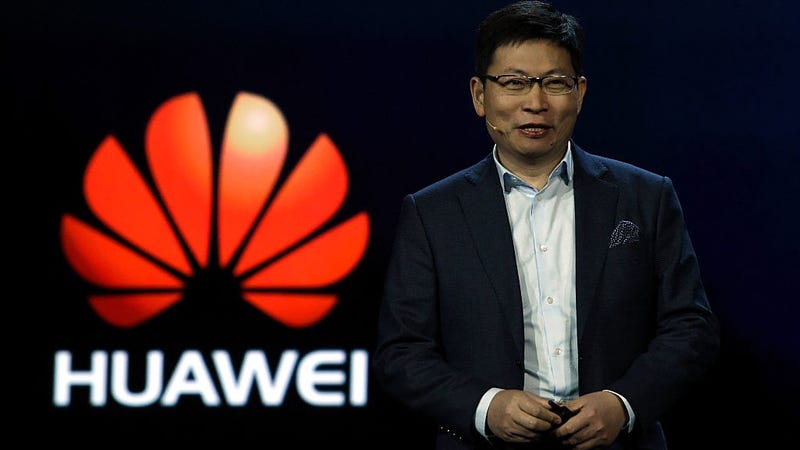Huawei beats Samsung in lawsuit over wireless patent , II Why US carriers won’t sell the best phone in the world , II The American Dreams of China's Biggest Smartphone Brand Are Basically Dead

HTC Vive Leaps Forward
01/09/2018
.
For the last year, Shenzen-based Huawei has been in talks with AT&T to carry its smartphones. According to Counterpoint research, the company surpassed Apple as the world’s second largest smartphone brand last year, but its sales in the US are comparatively dismal. The primary reason is that none of the top four wireless providers in the US carry Huawei’s phones. That was all going to change this week when the company was set to take the stage at CES, announce its new partnership with AT&T, present Gal Gadot of Wonder Woman as its new brand ambassador, and make a huge splash. But on Tuesday, it belly flopped.As TechCrunch points out, Republican Representative Michael Conaway has introduced a new bill that would ban the US government from doing business with any service providers that work with Huawei or ZTE. Both are Chinese firms that have been singled out due to concern that they are working with China’s government and pose an intelligence risk. TechCrunch broke down the broad strokes of the bill. If passed, it would prohibit the US from engaging with any third party that uses:
Telecommunications equipment produced by Huawei Technologies Company or ZTE Corporation (or any subsidiary or affiliate of such entities).All of this stems from a Congressional investigation in 2011 that ultimately concluded Huawei, ZTE, and some smaller companies were being directed by the Chinese Communist Party. Michael Hayden, director of the CIA at the time, also claimed that Huawei shared information about foreign telecommunications systems with the Chinese government. This led to legislation that essentially banned all of Huawei and ZTE’s telecom networking equipment like routers and antennas from being sold in the US. As of 2016, Huawei was the biggest provider of telecom equipment in the world, and ZTE ranked seventh.
Telecommunications services provided by such entities or using such equipment.
Telecommunications equipment or services produced or provided by an entity that the head of the relevant agency reasonably believes to be an entity owned or controlled by, or otherwise connected to, the government of a covered foreign country.

Back in 2016, Huawei sued Samsung for allegedly violating several of its patents. Lawsuits were filed in both California and China, the latter of which has proven fruitful for the company. A judge in Shenzhen ruled yesterday that Samsung has infringed upon one of Huawei’s wireless communications patents. As a result, Samsung has been ordered to stop selling products that utilize the technology (in China, that is).
At the heart of the legal issue is Huawei’s claim that Samsung has infringed upon its intellectual property, and while the California case continues, the Chinese one has been partially successful for Huawei. According to a court in Shenzhen, Samsung has infringed upon a single Huawei patent concerning wireless communications.
This isn’t the first time Huawei has gotten a favorable ruling in China. In 2017, the company was awarded the equivalent of about $12 million in damages by the Quanzhou Intermediate People’s Court, which found Samsung to be in violation Huawei’s IP. Huawei had also instigated legal action in Beijing, though the results of that is unclear.
According to Chinese publicaton Caixin, Samsung said in a statement that it will be reviewing the decision carefully before responding “in accordance with” local laws. In this particular ruling, the South Korean company has been ordered to pay a fee to the court — one described as “small” — but no further monetary charges were applied. However, Samsung can’t sell products containing the Huawei tech in China now.
Whether Huawei will see the same success in California is anyone’s guess. Companies have increasingly filed patent-related lawsuits in China as the nation takes position as the world’s top smartphone market.
Huawei beats Samsung in lawsuit over wireless patent , II Why US carriers won’t sell the best phone in the world , II The American Dreams of China's Biggest Smartphone Brand Are Basically Dead
Huawei Mate 10, China, AT&T, Samsung,china,huawei,legal,mobile,patent,patents,phones,samsung,
At the heart of the legal issue is Huawei’s claim that Samsung has infringed upon its intellectual property, and while the California case continues, the Chinese one has been partially successful for Huawei. According to a court in Shenzhen, Samsung has infringed upon a single Huawei patent concerning wireless communications.
This isn’t the first time Huawei has gotten a favorable ruling in China. In 2017, the company was awarded the equivalent of about $12 million in damages by the Quanzhou Intermediate People’s Court, which found Samsung to be in violation Huawei’s IP. Huawei had also instigated legal action in Beijing, though the results of that is unclear.
According to Chinese publicaton Caixin, Samsung said in a statement that it will be reviewing the decision carefully before responding “in accordance with” local laws. In this particular ruling, the South Korean company has been ordered to pay a fee to the court — one described as “small” — but no further monetary charges were applied. However, Samsung can’t sell products containing the Huawei tech in China now.
Whether Huawei will see the same success in California is anyone’s guess. Companies have increasingly filed patent-related lawsuits in China as the nation takes position as the world’s top smartphone market.
Huawei beats Samsung in lawsuit over wireless patent , II Why US carriers won’t sell the best phone in the world , II The American Dreams of China's Biggest Smartphone Brand Are Basically Dead
Huawei Mate 10, China, AT&T, Samsung,china,huawei,legal,mobile,patent,patents,phones,samsung,

No comments
Post a Comment